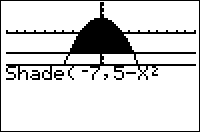TI-BASIC:Shade: Difference between revisions
From Learn @ Cemetech
Jump to navigationJump to search
Initial automated import |
Automated @@ correction |
||
| Line 2: | Line 2: | ||
|picture=SHADE.GIF | |picture=SHADE.GIF | ||
|summary=Graphs two functions and shades the area between them. | |summary=Graphs two functions and shades the area between them. | ||
|syntax=Shade(''lower func'', ''upper func'', | |syntax=Shade(''lower func'', ''upper func'', <nowiki>[</nowiki>''xmin'', ''xmax'', ''pattern #'', ''resolution'']) | ||
|location=Press: | |location=Press: | ||
# 2nd DRAW to access the draw menu. | # 2nd DRAW to access the draw menu. | ||
| Line 12: | Line 12: | ||
The Shade( command draws two functions and shades the area between them. | The Shade( command draws two functions and shades the area between them. | ||
Shade(''lower func'', ''upper func'', | Shade(''lower func'', ''upper func'', <nowiki>[</nowiki>''xmin'', ''xmax'', ''pattern #'', ''resolution'']) | ||
* ''lowerfunc'' and ''upperfunc'' are the two functions (whenever ''lowerfunc''<''upperfunc'', the area between them will be shaded) | * ''lowerfunc'' and ''upperfunc'' are the two functions (whenever ''lowerfunc''<''upperfunc'', the area between them will be shaded) | ||
Latest revision as of 21:39, 24 February 2016
Command Summary
Graphs two functions and shades the area between them.
Command Syntax
Shade(lower func, upper func, [xmin, xmax, pattern #, resolution])
Menu Location
Press:
- 2nd DRAW to access the draw menu.
- 7 to select Shade(, or use arrows.
TI-83/84/+/SE
1 byte
The Shade( command draws two functions and shades the area between them.
Shade(lower func, upper func, [xmin, xmax, pattern #, resolution])
- lowerfunc and upperfunc are the two functions (whenever lowerfunc<upperfunc, the area between them will be shaded)
- xmin and xmax (optional) are left and right boundaries on where to shade.
- pattern # (optional) is an integer 1-4 determining which pattern to use:
- 1 -- vertical shading (default)
- 2 -- horizontal shading
- 3 -- diagonal shading (negative slope)
- 4 -- diagonal shading (positive slope)
- resolution (optional) is an integer 1-8 determining the spacing between shading lines. When it's 1 (default), everything is shaded, when it's 2, one pixel is skipped between lines, and so on - when it's 8, seven pixels are skipped.
Note that if you don't supply the resolution argument, it defaults to 1 and everything gets shaded regardless of the pattern.
Advanced Uses
Shade(Ymin,Ymax) is the smallest (though not the fastest) way to shade the entire screen.
